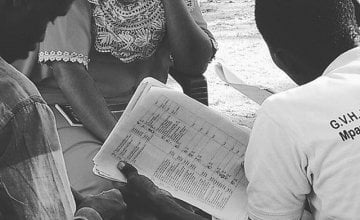
Read our 2024 annual report

Knowledge Hub
The advantages of digital data collection in Malawi

While paper still plays an important role in Malawi for collecting data, Concern has been investing considerably more in Digital Data Gathering (DDG) devices to help conduct surveys. EU Aid Volunteer (EUAV) Caroline outlines the benefits and challenges of using such devices in a country with limited access to electricity and the internet.
Speaking from experience
Being an EUAV gave me the opportunity to go plenty of times into the field, and coordinate several survey conductions - some with paper, which not only made the task of collecting data longer and more cumbersome, but it also hindered the quality of data collected. In July 2017, I had to coordinate a baseline survey for a new integrated programme called the Graduation programme. This required me to stay in the field for more than a month in order to manage the entire process. We worked mostly with DDG devices, which helped make the process of data collection faster, more reliable and more cost effective.
Time efficient
Printing several multi-paged surveys can take time and filling in said paper surveys can take even longer, especially if the survey is quite complicated. What's more, time needs to be allocated to enter the data electronically for further analysis. A DDG device presents simple options to click and analysis can be done as soon as the data is collected and stored onto a network.

More reliable
Paper can unfortunately get lost quite easily and is extremely vulnerable to bad weather. While DDG devices do need to be stored safely and sometimes have technical issues, they are water resistant and always provide the opportunity to safely store data. Also, even though Malawi is a country with limited access to the internet and electricity, there are ways around this. For example, Gensets (electric generators) are used to charge batteries and sim cards are used for mobile internet.
Higher quality
No matter how good or long the training is, mistakes are often made using paper. DDG devices ensure that these errors are minimised since it’s not possible to skip questions or enter illogical data. These devices are also extremely user friendly, making surveys less of a chore for participants to complete. Also, with features such as photos and GPS included, the quality of data collected is much greater.

Faster analysis
Using DDG devices allows us to analyse data quicker and provides us with a snapshot of the situation without having to make the calculations ourselves. This is hugely beneficial in terms of time but also ensures that the analysis is done correctly.
Bidding farewell
As I am about to close this chapter of my life, I can look back and reflect on what the experience has taught me. Visiting the field and registering the participants in the Graduation programme was not without its challenges, but DDG devices made the whole process easier and more reliable. From my experience, it is clear that Concern targets the most vulnerable and leaves no one behind. Being part of that process was hugely motivating and will remain one of the most interesting experiences of my placement.
Like to read more?
Find out more about our work in Malawi.





